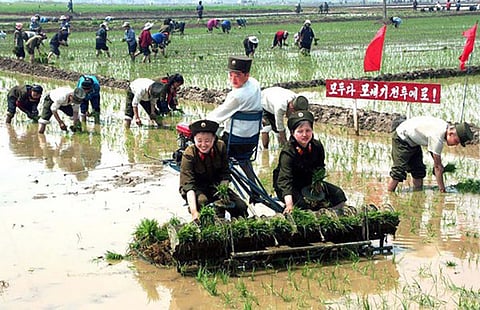The majority of military service is already spent doing hard labor.
The North Korean government routinely uses soldiers for free labor on farms, in coal mines or on construction sites. Life as a soldier is harsh; living quarters are barren and food rations meager.
“The reality of the Korean People's Army these days is that young people avoid enlisting and there are many deserters due to poor diet and bad living conditions,” the source said. “Also they already thought the service time was too long.”
RFA was not able to confirm if soldiers who entered the service after the 2021 change and before April will have to extend their service time, or if women who elected not to serve will now have to enlist. But soldiers who were set to be discharged this year will instead be made to do an additional three years.
Giving up one’s youth
Young people are furious over the decision because it means they will have to spend most of their 20s in uniform doing hard labor, the source said.
“During their golden years of youth, men have to sacrifice 10 or 11 years and women for eight years, so those who are enlisting and their parents are angry, saying ‘Where else in the world is there this kind of slavery?’” the source said.
North Korea’s mandatory military service time is already much longer than in other nations. In neighboring South Korea, men must serve 18 months.
More young people are expected to do whatever they can to avoid enlisting, a resident of the northern province of Ryanggang told RFA on condition of anonymity to speak freely.
There are several ways to get out of serving. Generally people are exempt if they have unusual medical issues, family problems or are deemed security risks because they are related to people who have escaped the country.
College is another way out, but the authorities are trying to close that loophole.
“They took measures to restrict the number of people recommended for university admission, except from those who went to gifted high schools,” the second source said.
The gifted schools are for students who excel in their studies. Because they are considered to be on the college track they are exempt from serving.
In addition to working on farms, the extension of service might be an attempt to repopulate the rural parts of the country, the second source speculated.
”Young soldiers in their late 20s will go out to the farms and will likely meet local women. Then they will likely start a family and stay in the rural areas,” she said. “This can help increase the number of farmers.” (KB/RFA)


